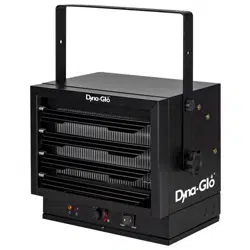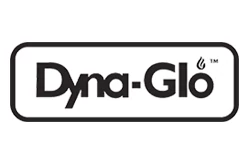Documents: Go to download!
- User Manual - (English, French, Spanish)
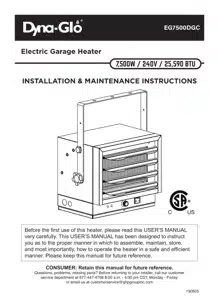
User Manual
LOCATING HEATER
Install heater away from traffic areas, maintaining clearances stated in figure 2 (below). The air flow direction should not be restricted (ie. by columns or machinery). The air flow should wipe exposed walls rather than blowing directly on them. When more than one heater is used in an area, heaters should be installed so that the air discharge of each heater supports the air flow of the others, to provide best warm air circulation as shown in figure 3
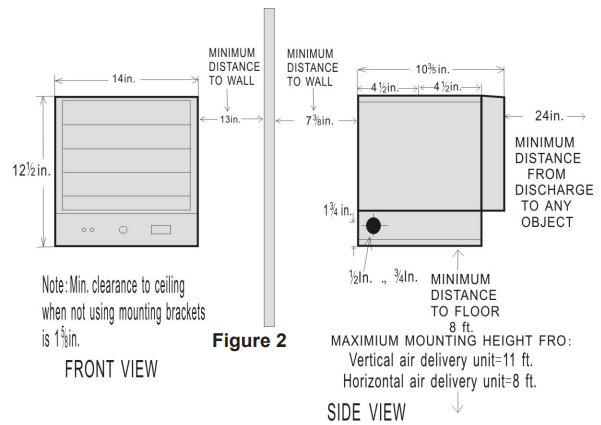

INSTALLATION
MOUNTING THE BRACKET
Refer to Figures 4a and 4b.
- Locate a wood stud in the wood ceiling joist. If you cannot locate a wood stud, you have to install a wood piece on the ceiling as this heater must be securely fastened.
- Remove the mounting bracket from the heating unit by loosening bracket screws with a wrench and slipping the handle off over the screw heads.
- Place a washer on screws before inserting through the holes in the mounting bracket and screw them securely into a ceiling joist.
NOTE: If you want to swivel the heater either to the right or left adding a washer to both sides of the bracket is recommended. A longer lag bolt may be required to properly secure the unit. See Figure 4a.
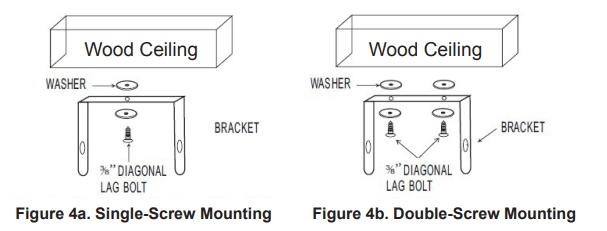
HANGING THE HEATER
- Attach the heating unit to the mounting bracket.
- Lift the heater up and into the mounting bracket.
- Align the bracket screws with the keyhole slots in the mounting bracket.
- If the heater is to be tilted it must be positioned in the keyhole slots - see figure 5.
- Tighten the bracket screws with a wrench so the unit is securely suspended at horizontal or vertical level.

ADJUSTING AIR FLOW DIRECTION
1. To turn the unit when it has been installed with a single lag bolt (as shown in figure 4a), simply turn the entire heater as needed. The unit cannot be turned horizontally if it has been installed with 2 lag bolts.
2. To tilt the unit vertically, loosen the bracket screws (see figure 5).
NOTE: For the heater to be tilted vertically, it must be mounted in bottom keyhole slots of mounting brackets to maintain adequate clearance and prevent possible overheating.
3. Adjust louvers to the desired position (see Figure 6).
NOTE: The louvers are designed so they cannot be completely closed. Do not attempt to bypass this feature; damage to the unit can result.
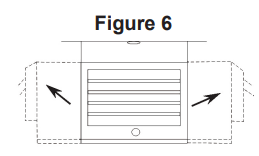
CONNECTING THE POWER
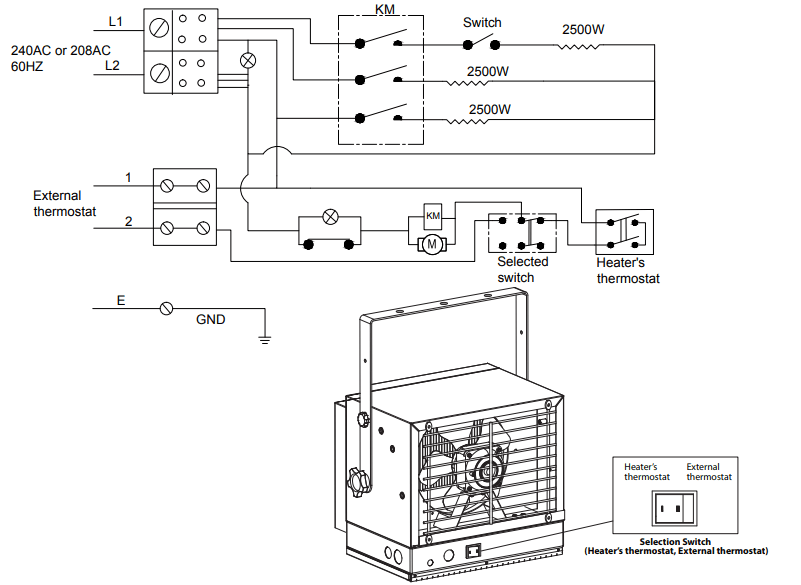
If you will use an external temperature control (external thermostat) to control the heater to be operated or not, please follow below attention points:
1. Make sure that the heater's temperature control knob (thermostat knob) is turned fully clockwise.
2. Connect the wire according to below wiring diagram.

3. The external temperature control (external thermostat) should be in accordance with the requirement of UL or CSA standard.
4. The lead wire of external temperature control (external thermostat) can not be less than 14AWG.
TO PROTECT THE HEATING ELEMENT
When starting the heater, turning the temperature control clockwise slowly to terminal, the unit starts the fan first then starts the heating element. When shutting off the heater, turning the temperature control counter-clockwise to off, the heating element first will turn off then the fan will run a short cooling cycle and then turn off.
1. Remove the screw from the front of the unit to connect the power to the heater.
2. Attach the cable connectors to the unit (See Figure 7) and slide the 10-gauge wire through the cable connector.
NOTE: All wiring must be carried out by a Certified Electrician and must be in accordance to national and local electrical codes in the United States. For certain applications, conduit may be required, See Figure 7. Check local electrical codes. If you run the wiring in conduit and wish to be able to turn the heater be sure to purchase enough flexible conduit to allow the heater to be turned
3. Connect the wire to the power block located in the base of the heater - See Figure 7.
4. Turn on the power at the main service.
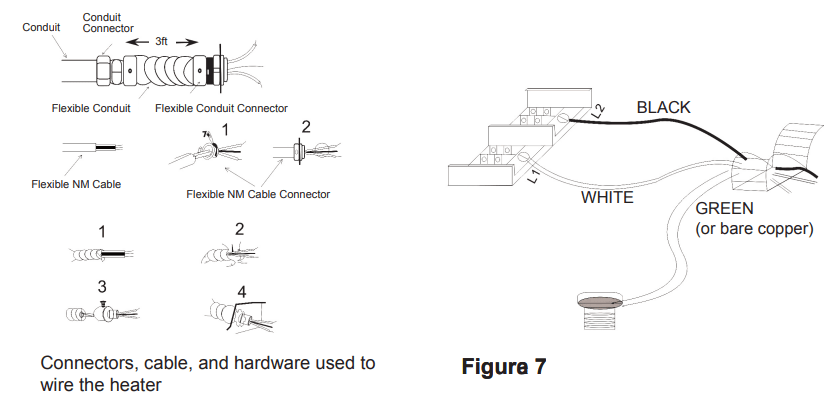
OPERATING INSTRUCTIONS
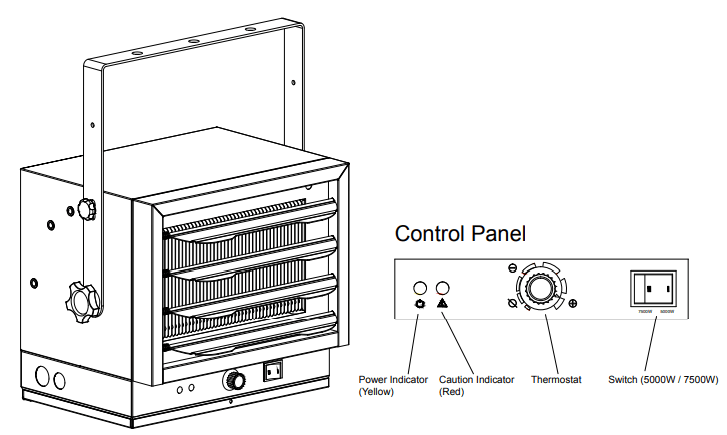
Check that the garage heaters outlet grill is not covered or obstructed in anyway, and make sure the power to the unit is switched on.
SETTING THE THERMOSTAT
- Rotate thermostat knob clockwise to desired position, POWER INDICATOR will turn yellow.
- After room reaches desired comfort level the heater will turn off. Heater will cycle on and off to maintain room temperature.
SELECTION SWITCH
Using the SELECTION SWITCH, you can control the heating output: I for 5000W, II for 7500W.
THERMAL CUT-OUT
The heater will automatically shut off when parts of it overheat. The heater will turn ON again when the abnormal temperature returns to normal levels. Should the unit overheat and cause the thermal cut-out to cycle, the cause of the overheating should be determined and corrective action taken before further operation.
NOTE: When the thermal cut-out is activated, the caution indicator will turn red. In this case, immediately turn the heater OFF and inspect for any objects on or adjacent to the heater that may cause high temperatures. DO NOT OPERATE THE HEATER WITH THE CAUTION INDICATOIR GLOWING RED.
ADJUSTING AIR FLOW DIRECTION
- To turn the unit when it has been installed with a single lag bolt (as shown in figure 4a), simply turn the entire heater as needed. The unit cannot be turned horizontally if it has been installed with 2 lag bolts.
- To tilt the unit vertically, loosen the bracket screws (see Figure 5).
MAINTENANCE
1. Before cleaning, make sure the power has been turned off at the circuit breaker panel and that the heating element of the heater is cool.
2. To maintain the external appearance of the heater, the unit occasionally needs to be wiped with a dry duster. During the summer months, or at other times when the appliance is not in use and is completely cold, it should be the wiped over with a damp cloth.
3. Do not use abrasive clearing powders or furniture polish. Do not use chemical or abrasive products, metallic scourers and so on, which may deteriorate the surface, to clean the appliance.
4. During the summer months, or at other times when the appliance is not in use, disconnect the power supply, and cover the whole appliance with a dustcloth. Moreover, keep the appliance in a dry and cool place.
5. All other servicing should be performed by qualified service personnel. Do not try to repair the heater yourself.
TROUBLESHOOTING
Unit is not heating.
- The overheat protection has activated.
- Inspect the garage heater and check that the air inlets and outlets are not blocked as this may cause overheating. Switch off the circuit breaker to the garage heater for 30 minutes and allow it to cool down. Turn the power back on and operate.
- The breaker has tripped
- Reset the breaker at the fuse panel and restart the heater
Garage heater emits a burning smell
- The room temperature has already reached the set thermostat temperature
- Adjust the temperature setting to make sure the thermostat setting temperature is higher than current room temperature.
- During production dust and/ or oil debris gathered on heating coils.
- Make sure the room is well ventilated. Allow the garage heater to run until the smell is dissipated.
- Check and make sure there is no combustible material within 0.9 meters (3 feet) of the garage heater.
- Remove the combustible material around the garage heater.
- This heater must be mounted at least 8 feet off the floor, for specific clearances, please check the "LOCATING HEATER" section in the instruction manual
- Relocate the garage heater so there is enough space between the heater and adjacent wall and floor.
See other models: EG7500DGP RMC-FA125DGD KFA80DGD KFA135DGD KFA50DGD
